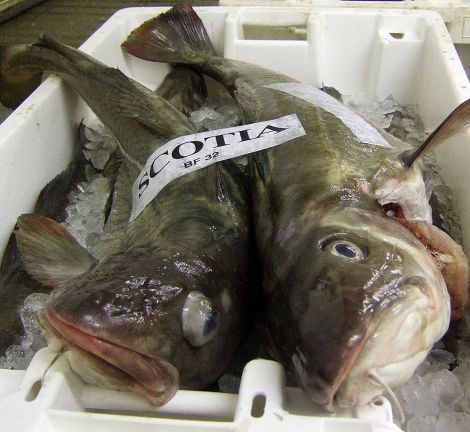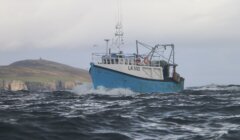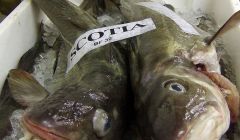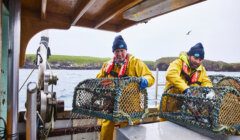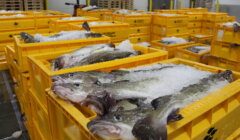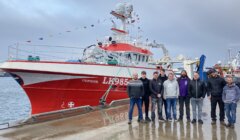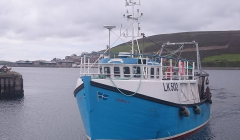Marine / Conservation key for proper fisheries management
Environmental pressure group Open Seas responds to mounting criticism from local fishermen leaders
A SCOTLAND based conservation charity has called for a root and branch reform of fisheries management to ensure a sustainable future for fishing both environmentally and economically.
Last month local fishing leaders accused environmental pressure groups, including Open Seas, of peddling nonsense when warning that North Sea cod was an endangered species.
And earlier this month, the chairman of the Shetland Fishermen’s Association (SFA) James Anderson warned politicians that some local fishermen would go out of business if the ICES recommendation of cutting next year’s cod quota by just over 10 per cent was accepted.
The SFA claims that even an increase of 30 per cent in the cod quota would allow the North Sea stock to grow by 24 per cent.
But Nick Underdown of Open Seas said that despite the observations of fishermen who report they have never seen so many cod on the fishing grounds, there are fewer spawning cod in the North Sea than ever before.
A reduction in fishing effort combined with proper conservation measures implemented by the Scottish Government would in the long term not only help a “vulnerable” species but also fishermen and their livelihoods, he said.
“We are definitely not challenging the direct and valuable observations of fishermen who may have seen good numbers of cod on local fishing grounds. Fish move about and local abundances can happen based on temperature or feeding behaviour,” he said.
“Scientific assessment provides an estimate of abundance, and it is currently estimated that there are fewer spawning cod in the North Sea than ever before – 37,912 tonnes of cod, compared to more than 200,000 tonnes in the 1970s and a more recent peak of 85,860 tonnes in 2016 when the measures taken to prevent overfishing were starting to work.
“This is definitely a cause for serious concern and it’s worrying that remedial measures were dropped and the fishery has gone back into decline.”
Become a member of Shetland News
He continued by saying that conservation measures were good for fishing as they would help recover fish populations and improve the living fishermen could make from growing fish stocks.
For this to happen though fisheries management in Scotland and the UK requires a major overhaul to overcome the “artificial and unhealthy divide” between conservation and fisheries policy, Underdown said.
Open Seas would like the following conservation measures to be introduced: –
- end overfishing by no longer setting fishing quota in excess of sustainable limits;
- end discarding unwanted fish at sea (hidden overfishing);
- protect and recover habitats such as inshore areas which are vital for juvenile fish to feed and mature;
- overhaul fisheries management by promoting and incentivising sustainability and benefits for coastal communities.
As such Open Seas is opposed to the creation of an ‘independent panel’ to access ICES (International Council for the Exploration of the Sea) as called for by fishing leaders.
“We are generally opposed to calls to create an independent panel because we fear the panel’s independence could likely be compromised, especially if it is being lobbied into existence by commercial interests,” Underdown said.
“Perhaps more importantly, we don’t know what the panel hopes to actually do if not redo work already done by ICES or commission research that stalls the implementation of ICES advice – neither of which would be helpful for anyone but the largest quota-owning businesses.
“The independence and transparency of a scientific advice is critical. Unfortunately, there are many examples of non-transparent decision-making by government in sea fisheries.
“Transparency, accessibility and independence are fundamental aspects of all environmental decision-making and founded in law under the Aarhus Convention.”
Meanwhile, SFA chairman Anderson said there is far more cod on the grounds than in the late 1990s when the cod quota was 10 times the size it is now.
“The irony of the situation surely can’t be lost on our own governments, when they enter into the negotiations that will take place based on the ICES advice,” he added.
“The choice is clear – a successful fleet or one that is emasculated because of utterly misguided decision making.”
Underdown said: “We would like to see a booming, well-regulated cod fishery in Shetland and around the rest of Scotland.
“Open Seas is a Scottish charity, and we contend that fisheries management in Scotland needs root and branch reform, because it is clearly not operating sustainably, neither in environmental nor in economic terms.”
Become a member of Shetland News
Shetland News is asking its readers to consider paying for membership to get additional perks:
- Removal of third-party ads;
- Bookmark posts to read later;
- Exclusive curated weekly newsletter;
- Hide membership messages;
- Comments open for discussion.
If you appreciate what we do and feel strongly about impartial local journalism, then please become a member of Shetland News by either making a single payment, or setting up a monthly, quarterly or yearly subscription.






